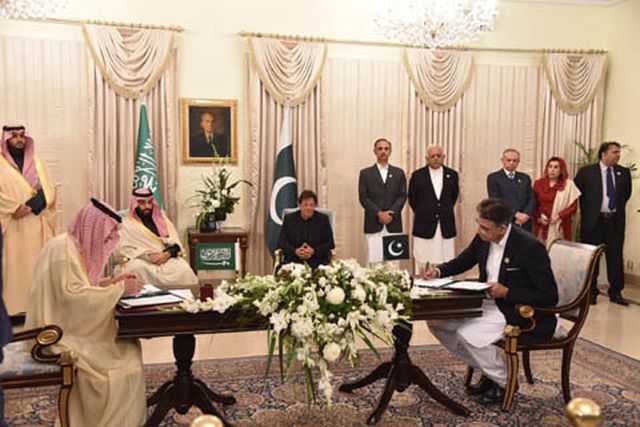
by admin | May 25, 2021 | Muslim World
 Riyadh : Saudi Crown Prince Mohammad bin Salman on Sunday signed with Pakistan eight agreements worth $20 billion, the media reported.
Riyadh : Saudi Crown Prince Mohammad bin Salman on Sunday signed with Pakistan eight agreements worth $20 billion, the media reported.
One of the agreements is about Saudi Arabia’s Aramco-run refinery in the Pakistani port of Gwadar, one of the world’s largest refineries, at a value of $10 billion, Xinhua reported citing the Al Arabiya TV.
“Pakistan is a dear country to the Saudi people and we will be partners as we have always been,” Al Arabiya quoted the Saudi Crown Prince as saying.
Saudi Arabia and Pakistan are working together to expand economic partnership, particularly in the tourism sector, he added.
The Crown Prince is currently on a two-day official visit to Pakistan, the first leg of his Asian tour, starting Sunday.
He is scheduled to visit India and China later.
—IANS
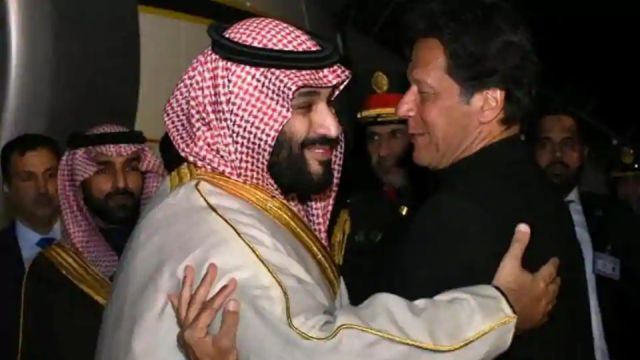
by admin | May 25, 2021 | Muslim World
 Islamabad : Visiting Saudi Crown Prince Mohammad bin Salman has said that Pakistan will be a very, very important country in the coming future and that his country had been waiting for a leadership like that of Prime Minister Imran Khan to partner with Islamabad in various areas.
Islamabad : Visiting Saudi Crown Prince Mohammad bin Salman has said that Pakistan will be a very, very important country in the coming future and that his country had been waiting for a leadership like that of Prime Minister Imran Khan to partner with Islamabad in various areas.
The Crown Prince arrived in Pakistan on Sunday evening on a two-day visit after which he will travel to India to meet Prime Minister Narendra Modi.
Addressing a reception dinner at the Prime Minister House here, the Crown Prince called Pakistan a “dear country” to all Saudis and said the two countries had “walked together in tough and good times”, Dawn news reported on Monday.
“We believe that Pakistan is going to be a very, very important country in the coming future and we want to be sure we are part of that. Pakistan today has a great future in store with a great leadership.”
The Saudi royal said his country will collaborate with Pakistan economically, politically and in terms of security. “We believe in our region, that is why we are investing in it.”
“This is my first trip (to the) east since I became the Crown Prince (in 2017) and the first country (that I have visited) is Pakistan,” he added.
Bin Salman also ordered the immediate release of 2,107 Pakistani prisoners languishing in the kingdom’s prisons after the issue was raised by Khan at the dinner.
Giving details, Foreign Minister Shah Mehmood Qureshi tweeted on Monday: “Cases of the remaining (Pakistani prisoners) will be reviewed. People of Pakistan thank His Royal Highness Prince Salman for responding immediately to Prime Minister Imran Khan’s request.”
Khan had also urged the Crown Prince to look into the hardships of the Pakistani labourers working in the Kingdom.
“Crown Prince Mohammad bin Salman won the hearts of the people of Pakistan when he said ‘Consider me Pakistan’s ambassador to Saudi Arabia’ in response to my asking him to treat the 2.5 million Pakistanis working in Saudi Arabia as his own,” the Pakistani leader tweeted.
Saudi Arabia and Pakistan on Sunday signed Memorandums of Understanding (MoU) for bilateral cooperation worth $20 billion.
The deals included exploration of investment opportunities in refining and petrochemical sectors; cooperation in sports; financing agreement for import of Saudi goods; power generation projects; and development of renewable energy projects.
Also on Sunday, Khan and Bin Salman held a one-on-one meeting which was followed by the inaugural session of the Saudi-Pakistan Supreme Coordination Council.
The Saudi royal’s visit was initially scheduled for February 16, but was delayed by a day for unknown reasons.
—IANS
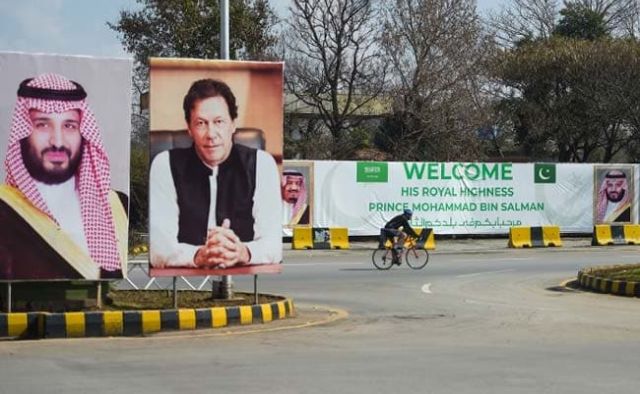
by admin | May 25, 2021 | Muslim World
 Islamabad : Saudi Crown Prince Mohammad Bin Salman’s visit to Pakistan that was scheduled to start on Saturday, has been cut short by a day rescheduled for Sunday-Monday, the Pakistan Foreign Office has said.
Islamabad : Saudi Crown Prince Mohammad Bin Salman’s visit to Pakistan that was scheduled to start on Saturday, has been cut short by a day rescheduled for Sunday-Monday, the Pakistan Foreign Office has said.
Salman, who was scheduled to visit Pakistan on February 16 along with a business delegation with big-ticket investment potential, not only did cut short his visit by 24 hours but also dropped the business delegation from his entourage.
Following which the Islamabad-based Board of Investment, which reports to Prime Minister Imran Khan, in a statement to invitees said the Pakistan-Saudi businesses conference scheduled on February 17 has been postponed.
“Any inconvenience caused in this regard is highly regretted. The new dates of the meeting will be informed in due course of time,” it said.
The development came barely 48 hours after some 49 CRPF troopers died in a suicide attack by the Pakistan-based Jaish-e-Mohammed, whose chief Masood Azhar roams freely on Pakistan soil and was yet to be designated a global terrorist.
The Pakistan Foreign Office said: “His Royal Highness Prince Mohammed bin Salman, Crown Prince, Deputy Prime Minister and Minister of Defence of the Kingdom of Saudi Arabia will visit Pakistan on February 17-18, 2019. The visit programme remains unchanged.”
The Crown Prince is visiting at the invitation of Pakistan Prime Minister.
He would be accompanied by a high-powered delegation including members of the Saudi Royal family and key ministers on Sunday, the News International said.
Pakistan Foreign Office Spokesperson Mohammad Faisal earlier had said Saudi-Pakistan Supreme Coordination Council (SCC), led by Salman and Khan will be launched during the visit of the Crown Prince.
—IANS
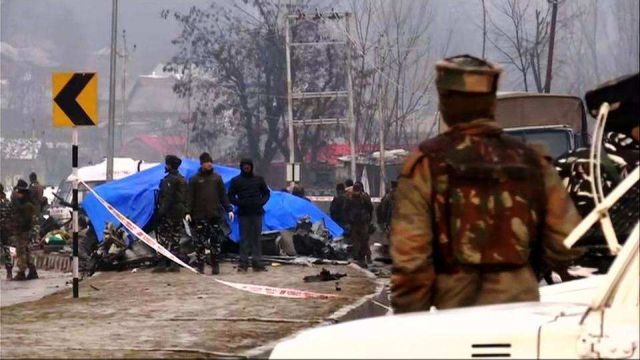
by admin | May 25, 2021 | News
 New Delhi : The international community has strongly condemned the terror attack by the Pakistan-based Jaish-e-Mohammed (JeM) in Jammu and Kashmir that killed 45 CRPF personnel, with US President Donald Trump asking Pakistan to “end immediately” the support and safe haven provided to all terrorist groups operating on its soil.
New Delhi : The international community has strongly condemned the terror attack by the Pakistan-based Jaish-e-Mohammed (JeM) in Jammu and Kashmir that killed 45 CRPF personnel, with US President Donald Trump asking Pakistan to “end immediately” the support and safe haven provided to all terrorist groups operating on its soil.
“The US calls on Pakistan to end immediately the support and safe haven provided to all terrorist groups operating on its soil, whose only goal is to sow chaos, violence and terror in the region. This attack only strengthens our resolve to bolster counter-terrorism cooperation and coordination between the US and India,” Trump’s Press Secretary Sarah Sanders said in a statement.
“We express our deep condolences to the victims’ families, the Indian government and the Indian people for the loss of life in this brutal attack,” the statement added.
China’s Foreign Ministry on Friday also denounced the attack, hoping that “relevant regional countries will cooperate to cope with the threat of terrorism and jointly uphold regional peace and stability”.
It added that the “JeM has been included in the UN Security Council terrorism sanctions list and that China will continue to handle the relevant sanctions issue in a constructive and responsible manner”.
An operative of the JeM group crashed a car bomb into a convoy of the Central Reserve Police Force (CRPF) in Pulwama district on the Srinagar-Jammu Highway on Thursday, making it the worst ever attack on security forces on any single day since a separatist campaign broke out in Jammu and Kashmir in 1989.
Afghanistan’s President Ashraf Ghani and Chief Executive Abdullah Abdullah stressed the “need for solidarity and closer cooperation of countries in the fight against this common enemy”.
“Terrorism is a cancer in the region and it requires collective efforts to root it out,” Ghani said.
Russian President Vladimir Putin, in a message to Prime Minister Narendra Modi strongly condemned the “brutal crime” and said that “the perpetrators and sponsors of the attack, undoubtedly, should be duly punished”.
Putin reiterated Moscow’s “readiness for further strengthening counter-terrorist cooperation with Indian partners”.
The European Union in a statement said that “as a strategic partner of India, the EU reaffirms its full solidarity at such a difficult moment”.
Saudi Arabia also denounced the “cowardly” attack and said it stands with India against terrorism and extremism.
Canadian Foreign Minister Chrystia Freeland said her country “remains steadfast in its support of the global fight against terrorism,” reaffirming a resolve “to prevent radicalization and defeat terrorism in all its forms”.
Indonesia and Australia also slammed the strike.
The attack further damaged the already tense India-Pakistan diplomatic relations, with New Delhi saying it had evidence of Islamabad’s involvement in the carnage. It also withdrew the Most Favoured Nation trade status it had granted to Pakistan in 1996 under the World Trade Organization rules.
However, Pakistan dismissed accusations that it has links with the militants who carried out the attack. “We strongly reject any insinuation by elements in the Indian government and media circles that seek to link the attack to the State of Pakistan without investigations,” said the country’s Foreign Ministry in a statement.
—IANS
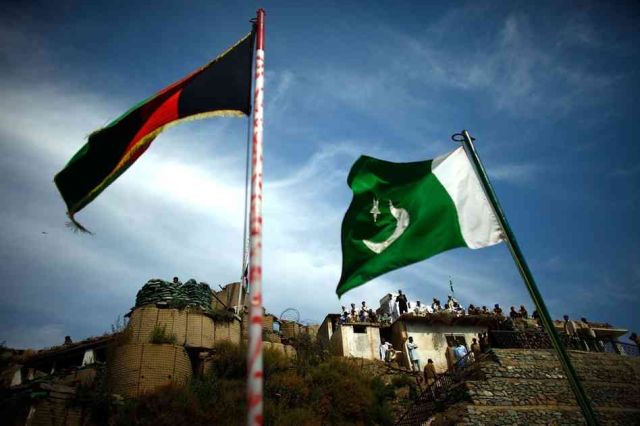
by admin | May 25, 2021 | Muslim World, Opinions
 By D. C. Pathak,
By D. C. Pathak,
President Donald Trump’s policy responses to the new global terror that arose out of a faith-based motivation range from an unequivocal denunciation of the countries that provided safe havens to Islamic radicals to an announcement of withdrawal of American troops from the two theatres of ‘war on terror’- Afghanistan and Syria. His decision on ending the deployment of US soldiers there is significantly rooted in his intrinsic aversion to the idea of US playing ‘the policeman of the world’ when others were not doing their bit – the businessman in him apparently getting the better of a supposed world statesman. Also, the US President was somewhere feeling the ‘comfort of distance’ and therefore seeking even some patchwork solution of a decidedly messy situation in Afghanistan so long as it reduced the threat of an attack from Islamic extremists on American soil.
It is ironic that Pakistan, criticised by the entire democratic world for harbouring terrorists on its soil and even reprimanded by Trump by way of the suspension of aid given to it earlier as an ally in the ‘war on terror’, is now likely to emerge as the biggest beneficiary of the US policy on Afghanistan. A half-baked truce struck by the US with the Taliban – in its impatience to see a phased withdrawal of American soldiers in Afghanistan in quick time – would be relished by the Pak army which had an intrinsic bonhomie with the radical outfit dating back to the victory of Afghan Jehad against the Soviet occupation. A Taliban-friendly dispensation in Afghanistan would tend to bring in Pakistan there and shut out India from its affairs.
A new situation is developing in Afghanistan posing an added strategic challenge for India. President Trump has no reason to remain stuck with the geo- politics of the Cold War- he already views Russia as a country at par with the European nations and regards China not so much as an ideological adversary as an economic rival. Although he had a visceral dislike of Islamic extremism- he ended the artificial divide between ‘good terrorists’ and ‘bad terrorists’ in relation to the groups active within Pakistan- he has changed the contours of the ‘war on terror’ by emphasising on the obligation of the Islamic countries – particularly members of the OIC chaired by Saudi Arabia- to come forth to counter radicalism for their own future interest, calling upon other countries having stakes in a peaceful Afghanistan to share the military burden in that troubled territory and gravitating towards a workable agreement between Taliban and the Ashraf Ghani government in Afghanistan for return of peace howsoever temporary.
The main point of assurance that the US Special Envoy for Afghan peace talks, Zalmay Khalizad, has sought from the Taliban leadership during the six-day long parleys at Doha in January is that no attack will be made on US targets. The Taliban has sensed an advantage in pursuing its prime objective of getting the US troops to leave Afghanistan in return for some kind of a cease-fire being announced by the former. The Taliban, which had an unalienable axis with Al-Qaeda, is now being acknowledged by the US in these talks as a rightful shareholder in Afghan ruling dispensation notwithstanding the history of its Emirate that had run the country from 1996 till 2001 with a brutal show of Islamic revivalism and gross fundamentalism.
The call of an ‘Afghan-led and Afghan-owned’ peace negotiation that India has actively supported is just a slogan yet as the Taliban leadership is being recalcitrant against the idea of talking to the Ashraf Ghani government and is merely aiming at securing withdrawal of US troops from Afghanistan without having to surrender its own arms. Pakistan is not on best of terms with Ashraf Ghani and is candescently watching the American moves to tackle Taliban- confident that the latter’s presence in Afghan mainstream would only help Pakistan. Pak army has tried to project itself as a helpful mediator between US and Taliban. Both Russia and China have kept Pakistan on the round table on Afghanistan for their own reasons of keeping their periphery protected from Islamic militancy with the cooperation of Pakistan. All of this adds to the prospect of Pakistan ending up having a sway in Afghanistan to the great disadvantage of India – and India alone. So long as US presence was there in Afghanistan the process of reconstruction of the Afghan National Defence & Security Forces(ANDSF) could go on and India’s contribution to the development of that country also remain unhindered. Ashraf Ghani has his writ running only in half of his country and it is doubtful if the involvement of the Taliban in the government would work to his or India’s advantage. The Pak-Afghan belt is destined to become a cause of deeper concern for us in the time to come.
The ‘war on terror’ is fizzling out because the two presumptions on which it was launched following 9/11 failed more or less completely – the expectation that the ‘moderates’ in the Muslim world will combat the radicals at home and that the US funding would help to advance the cause of democracy there. Pakistan, the ‘frontline’ ally of the US in the ‘war on terror’, is a stark illustration of this failure with Prime Minister Imran Khan finally making it public that Pakistan committed a mistake in fighting ‘the American war’. As a stalemate sets in both in Syria and Afghanistan, Pakistan feels even more free to step up its proxy war against India.
The Pakistan army looks at the Islamic elements of all hues as its strategic assets. This is clearly in evidence in the escalation of cross-border terrorism in Kashmir and the new moves Pakistan is making to get the separatists in the Valley to back gun-wielding terrorists and stonepelters who were targeting security forces. The Pakistan Inter Services Intelligence (ISI) is also reaching out to the Khalistani elements operating outside of India to revive an anti-India movement. It is no surprise that Pakistan is trying to fish in the troubled waters of India’s domestic politics in the run-up to the General Election here. Internal security concerns of India are likely to aggravate because of the attempts of Pak ISI to spread radicalisation and create more sleeper cells of Islamic terror in different parts of the country. Pakistan may remain a major challenge for India’s security strategy in the months ahead.
(The writer is a former Director Intelligence Bureau)
—IANS

 Riyadh : Saudi Crown Prince Mohammad bin Salman on Sunday signed with Pakistan eight agreements worth $20 billion, the media reported.
Riyadh : Saudi Crown Prince Mohammad bin Salman on Sunday signed with Pakistan eight agreements worth $20 billion, the media reported.



